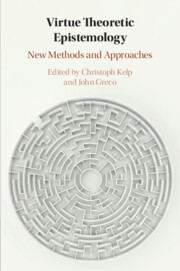Book contents
- Virtue Theoretic Epistemology
- Virtue Theoretic Epistemology
- Copyright page
- Contents
- Figures
- Contributors
- Acknowledgements
- Introduction
- Chapter 1 Closed-Mindedness As an Intellectual Vice
- Chapter 2 Epistemic Virtues and Virtues with Epistemic Content
- Chapter 3 Difficulty and Knowledge
- Chapter 4 What Is Epistemic Entitlement?
- Chapter 5 Knowledge-Producing Abilities
- Chapter 6 Virtue Epistemology, Two Kinds of Internalism, and the Intelligibility Problem
- Chapter 7 Knowledge Is Extrinsically Apt Belief
- Chapter 8 Explaining Knowledge
- Chapter 9 Anti-risk Virtue Epistemology
- Chapter 10 Responsibilism within Reason
- Index
- References
Chapter 9 - Anti-risk Virtue Epistemology
Published online by Cambridge University Press: 16 July 2020
- Virtue Theoretic Epistemology
- Virtue Theoretic Epistemology
- Copyright page
- Contents
- Figures
- Contributors
- Acknowledgements
- Introduction
- Chapter 1 Closed-Mindedness As an Intellectual Vice
- Chapter 2 Epistemic Virtues and Virtues with Epistemic Content
- Chapter 3 Difficulty and Knowledge
- Chapter 4 What Is Epistemic Entitlement?
- Chapter 5 Knowledge-Producing Abilities
- Chapter 6 Virtue Epistemology, Two Kinds of Internalism, and the Intelligibility Problem
- Chapter 7 Knowledge Is Extrinsically Apt Belief
- Chapter 8 Explaining Knowledge
- Chapter 9 Anti-risk Virtue Epistemology
- Chapter 10 Responsibilism within Reason
- Index
- References
Summary
Support is canvassed for a new way of approaching some core epistemic issues: anti-risk epistemology. It is explained how anti-risk epistemology differs from anti-luck epistemology by examining some of the subtle (but epistemologically significant) differences between the notions of luck and risk. It is argued that anti-risk epistemology, while essentially an adaption of anti-luck epistemology, can nonetheless resolve some motivational issues that face the latter proposal. In the process, it can provide other important benefits, such as enabling a broader range of epistemic assessments, including capturing the complexity of some important epistemic assessments involving collaborative inquiry. Our ultimate concern, however, is to examine how anti-risk epistemology fits into a wider virtue-theoretic account of knowledge, one that replaces anti-luck virtue epistemology with anti-risk virtue epistemology. As we will see, the latter proposal inherits all the strengths of the former but none of its flaws. It is also better placed to explain why knowledge is never compatible with unsafe belief, and to provide us with a diagnostic handle on the path taken by post-Gettier epistemology.
Keywords
- Type
- Chapter
- Information
- Virtue Theoretic EpistemologyNew Methods and Approaches, pp. 203 - 224Publisher: Cambridge University PressPrint publication year: 2020
References
- 11
- Cited by



